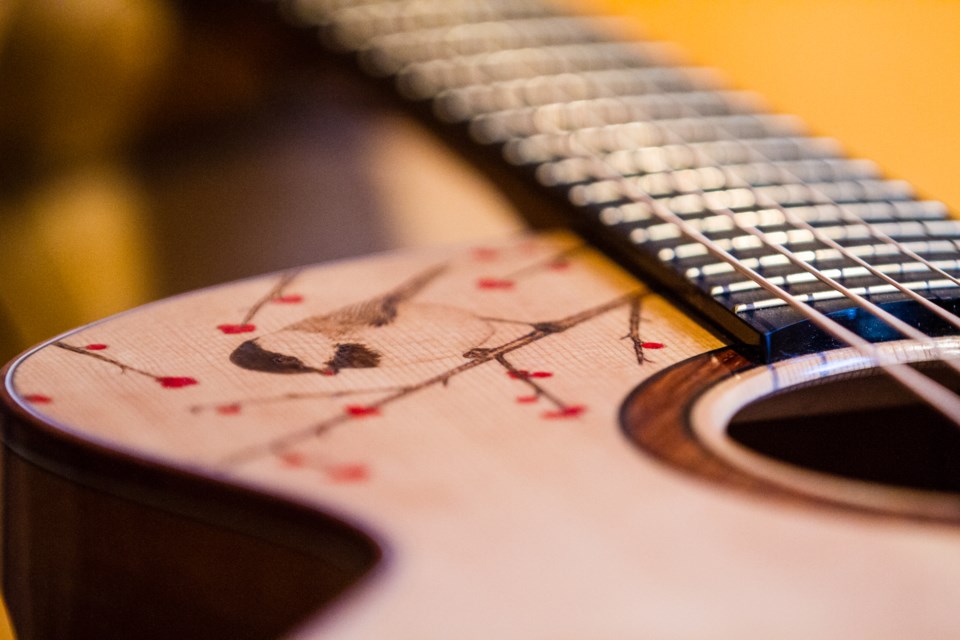If you happen to be a local musician in the market for a custom handmade guitar, be prepared to exercise a little patience.
Zach Lefebvre, the 26-year-old creative mind behind TreeHouse Guitars, has a two-and-a-half-year waiting list for custom orders, he recently told SooToday.
After officially launching his business in July 2012, Lefebvre’s reputation as a luthier with keen creativity and sharp focus on detail quickly grew.
Because of the nature of his designs and the manner in which they’re crafted and finished, he’s able to complete only a few custom orders each year.
He said he would like to eventually increase his productivity, but is not willing to compromise design or craftsmanship.
“I kind of don’t want to get faster (at building guitars) because I want to make sure my work is really clean and well executed,” he said.
While traditionally Lefebvre constructs his guitar tops from softwood such as spruce, much of the softwood found locally grows too fast, he said, making it structurally unsuitable for guitar making.
Materials used for the backs and sides vary and have included walnut, birds eye maple (which he sources locally), and East Indian rosewood.
“Indian rosewood is warmer, and the notes are blended together more,” he explained. “Maple is a more articulate wood. The notes are separated and there’s more projection. It’s not quite as warm sounding, but it’s got more power and more separation between the notes.”
“Every guitar I make is totally unique,” he added before explaining that his custom guitar clients often come to him with very specific design ideas and special items they wish included in the piece.
One project that stands out for Lefebvre is his ‘Revenant Guitar’ commissioned by Sault musician Joel Poluck.
In the design, he incorporated pieces of wood recovered from Lake Superior shipwrecks, bits of bone found on Batchawana Island and a custom birchbark ‘TreeHouse Guitars’ label.
In addition to one-of-a-kind inlay details, many of Lefebvre’s projects also include pyrographic images or designs.
Pyrography, or wood burning, is something he’s been perfecting for the last several years, he said, so marrying the art form with guitar making “just fit” when he first began creating instruments.
He does, however, limit the scope and position of the pyrographic designs so as not to compromise the instrument’s sound quality and overall aethstetic appeal.
To his knowledge, Lefebvre is the only luthier in the world to adorn his own instruments in this manner.
The most difficult, but possibly the most satisfying stage of building a guitar, Lefebvre said, is the finish.
Using a technique he learned under the tutelage of Sergei de Jonge in Quebec, his French polish is remarkably thin and requires an extremely delicate touch during application.
“It’s a really complicated process and really easy to mess up,” Lefebvre said. “There’s not a lot of guitar builders in the world that can do it well. You can still make a guitar and it will be okay. But with French polish, you can get it really glossy, which is something the handmade guitar market looks for.”
This method of polish also has minimal impact on the tone of the instrument, the payoff for opting for such a taxing application process, he said.
Although busy with custom orders, Lefebvre manages to create a few pieces for himself to showcase at luthier events, the most recent of which was the Woodstock Invitational Luthiers Showcase in New York.
This coming June, he’ll head to British Columbia for the Vancouver International Guitar Festival.
Complementing his visual artistry and craftsmanship, Lefebvre is also an accomplished musician and a founding member of The O’Schraves.
The family band operates the Algoma Traditional Music and Dance Group which hosts an annual week-long AlgomaTrad Camp each summer on St. Joseph Island.
The organization recently acquired a permanent home on the island and is slowly developing the Northern Heritage Arts Centre where Lefebvre hopes to eventually teach the art of guitar making.
The facility will offer instruction in a variety of music, art, and building disciplines, he explained, while focusing on heritage construction techniques.
Until this comes to fruition, those interested in acquiring a one-of-a-kind handmade TreeHouse Guitar can contact Lefebvre via his website or follow him on Facebook.
He currently has three guitars available for purchase.
